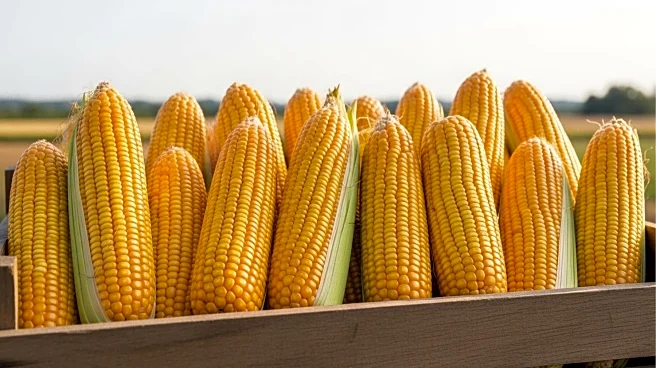What's Happening?
The Department of Agriculture is predicting a record corn crop for the upcoming season starting in September, while soybean yields are expected to reach new highs despite a smaller harvest. This abundance of crops comes at a time when trade tensions with China are affecting American exports, leading to depressed crop prices. Tariffs are also increasing costs for essential farm inputs like fertilizer, adding financial strain to farmers. The Trump administration has attempted to support farmers with increased biofuel blending guidelines and transformative changes in crop insurance protection under the One Big Beautiful Bill Act. However, the lack of a trade deal with China remains a significant concern for the agricultural sector.
Why It's Important?
The current situation poses a significant challenge for U.S. farmers, who are facing a surplus of crops with uncertain export prospects due to strained trade relations with China. This has led to financial difficulties, with warnings from the American Soybean Association and the National Corn Growers Association about a potential economic crisis in rural America. The increased costs of farm inputs and machinery, exacerbated by tariffs on steel and aluminum, further complicate the financial landscape for farmers. The agricultural sector's stability is crucial for the U.S. economy, and prolonged trade tensions could lead to increased bankruptcies and deteriorating credit conditions.
What's Next?
Farmers and industry leaders are hoping for a resolution to the trade tensions with China, which would provide a much-needed boost to the market. Companies like CNH Industrial NV and AGCO Corp. are showcasing new machinery at farm shows, but purchases remain light due to the current economic climate. The Trump administration's biofuel guidelines and crop insurance changes offer some relief, but the sector's recovery largely depends on trade developments. Farmers are adapting to the shifting conditions, with some making smaller investments in machinery parts and tires, while others are holding off on major purchases.
Beyond the Headlines
The ongoing trade tensions highlight the vulnerability of the U.S. agricultural sector to international relations and policy changes. The situation underscores the need for diversification in export markets and the importance of sustainable farming practices to mitigate financial risks. The current challenges may prompt a reevaluation of agricultural strategies and investments, potentially leading to long-term shifts in farming practices and market dynamics.










